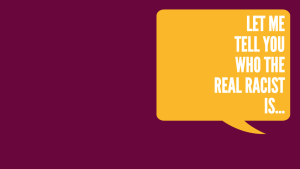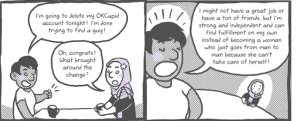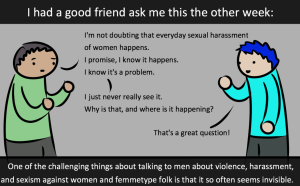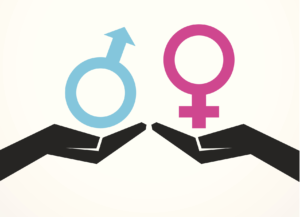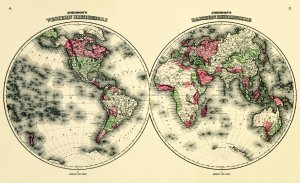#Blacklivesmatter. “Hands up, don’t shoot!” “We can’t breathe.”
Virtually everyone in the United States and many people across the world have become familiar with these battle cries.
It seems that this recent wave of high profile, race-based deaths that have occurred in the US has re-engaged and re-invigorated the national conversation about the crisis of racism the continues to plague the nation.
Unfortunately, many White people in the US have been reacting defensively to People of Color who’ve pointed out the pervasive and systematic white supremacy that made these tragic deaths possible. Instead of engaging in constructive dialogue, many White US Americans even accuse them of “reverse racism.”
When complaining about affirmative action in college and the workplace, for example, or providing counter protests in support of police officers, many White people claim that they are the true victims of racism, not People of Color.
Only here’s the thing: “Reverse racism” doesn’t exist because racism cannot go in reverse.
If recent events have taught us anything, it’s that honest conversations about race are more important than ever.
So, let’s examine racism and privilege and see what’s really going on here.
What Is Racism?
Racism starts with race.
Race is a faulty system of classification – with no biological basis – that utilizes specific physical characteristics to categorize humans into supposedly distinct groups.
Disregarding all of the other traits that differ among individuals, race teaches us that certain attributes — such as skin color, hair texture, or eye shape — are somehow more significant.
These characteristics are arbitrary, though not accidental. Indeed, we could just as easily classify people according to height, for example. But we don’t (at least, not in any systemized way).
Because racism in the Americas is designed to protect white property and disempower People of Color.
Historically, the white elite justified the enslavement and exploitation of People of Color. They taught society that People of Color deserved to be enslaved or indentured or colonized, claiming that certain external differences imply more profound, internal differences.
However, despite the abolition of slavery, for example, we have inherited this racist system that seeks to oppress People of Color while privileging White people.
We are still taught, in other words, that certain external racial markers suggest something about a person’s inherent morality, violent tendencies, athletic ability, musicality, intelligence, and so on.
Categorizing people in this way and establishing a false moral hierarchy is racism.
Racism is individual thoughts and actions as well as institutional patterns and policies that create unequal access to opportunities, resources, and power based on the notion of race – that is, based on imagined differences among groups.
What Is White Privilege?
Racism is a two-sided coin. On one side, you have oppression.
Oppression is the subjugation of one group of people by another group who has access to social power.
This is the side that most White people recognize. Indeed, this is often how race and racism are taught in schools (when they are taught at all).
We learn about centuries of slavery of Africans and their decedents. We learn about genocidal westward expansion directed against Indigenous peoples. We learn about Jim Crow segregation.
Some of us even learn about Japanese internment; Chinese, Filipino, and Mexican indentured servitude; the war on drugs and the prison industrial complex – the list continues.
The way we are formally taught about race is as the stripping of rights (or, the failure to provide rights to everyone equally).
What we acknowledge less frequently, however, is the other side of the coin: privilege.
Yes, racism is expressed through the oppression of People of Color. But it is also expressed through providing White people with unearned benefits. And these benefits are maintained by social beliefs and practices.
This is the side that most People of Color are able to recognize quite clearly.
But many White people don’t.
That’s not surprising, though, because that’s how privilege works – the beneficiaries are never taught to acknowledge the unearned rewards of a racialized system.
They never have to acknowledge them.
Because privilege – unlike oppression – isn’t dangerous.
We know the statistics. White privilege is real and unduly provides White people with unearned assets, including lower rates of arrest, higher college admission rates, being less likely to be perceived as violent, higher rates of finding adequate housing, and so on.
However, instead of recognizing the systematic privilege that they receive, many White people deny its existence. Some even claim to be the victims of racism themselves. Some attempt to argue that People of Color are the ones with privilege.
So, What’s Going On?
Many of the conversations I’ve had with White people about racism have veered in frustratingly predictable directions.
Rather than acknowledging their own privilege and the role that they (even tacitly) play in reinforcing a racialized society, I often hear one of two refrains.
The first is, “I didn’t own any slaves. Why are they mad at me?”
The second, often follow-up, is, “My relatives weren’t even in the States back then. They were struggling, themselves, in Europe. And then they came here, without a cent to their name. They worked hard. They didn’t complain. And they made a life for themselves.”
These statements reflect a fundamental misunderstanding about racism.
One does not have to have been a slaveholder to be racist. And a Black person does not have to have been a slave in order to suffer racialized oppression.
Such statements distort and devalue the experience of racism in the US. They also disregard the racism experienced by non-Black People of Color.
Furthermore, one cannot compare the White immigrant experience with that of being a (descendent of a) Black slave. Because, contrary to their Black counterparts, White Americans were not systematically oppressed.
Of course, one can cite the litany of White groups that were suppressed at one time or another in the US. Yes, Germans, Italians, the Irish, and Catholics were discriminated against.
But they aren’t systematically oppressed anymore.
And the reason goes back to those arbitrary physical features by which we racially categorize one another. Following a generation of assimilation, Germans, Italians, the Irish, and Catholics were, for the most part, able to blend in to White society and take advantage of its benefits.
People of Color weren’t.
Further, many European immigrant ghettos were allowed to be self-sustaining and abundant. However, hotspots of Black economic enterprise (such as Black Wall Street) were destroyed by White rioters and terrorists when they accumulated too much wealth.
That does not stop many White people, though, from arguing that if one just works hard enough they’ll be able to advance (regardless of individual differences).
Indeed, it is the myth of the American dream – aka, that white privilege doesn’t exist – that often influences a White person’s denial of racial influences.
Because White people are not oppressed, they are in the privileged position to minimize the role of racism in society.
Citing their own colorblindness, some accuse others – People of Color and White people, alike – of racism for merely mentioning the term. They claim, “You know who talks about race? Racists!”
The Blame Game
This reflects a preoccupation with and misunderstanding of current social and economic problems – not to mention a reluctance to acknowledge wider systems of oppression and power.
Particularly since the Great Recession of 2007, all Americans – except the wealthiest – have struggled financially. And while the economy has grown and unemployment has shrunk in recent months, many middle class (and all working class) families continue to struggle.
This has rightfully led to frustration over their continued financial struggles.
However, the object of their frustration is often grotesquely misplaced.
The country’s economic woes have many culprits.
We can — and should — levy blame against the (predominantly White) predatory lenders and the legislators who refuse to prosecute them, against the (again, predominantly White) CEOs whose salary is 900 times greater than their lowest paid employees, against the (once more, predominantly White) politicians who reject minimum wage increases and the businesspersons and super-PACs who fund their campaigns.
Instead, many White people victimize themselves and attribute a weak American economy to communities of Color.
Many blame this economy on “lazy” People of Color who supposedly prefer public assistance to hard work. I’ve heard multiple times, “They should just go get a job.”
Paradoxically, others blame their own joblessness on affirmative action, suggesting that an unqualified person of color was given a job instead of their more deserving White counterpart.
(So what’s the actual economic problem here – People of Color without jobs or People of Color with jobs?)
Others, still, accuse People of Color of “playing the race card” in order to get their way in any social situation.
Such rhetoric ignores that the majority of those on public assistance are White and have jobs, that affirmative action is not a quota system, and so on.
But that’s not the point.
Because this is the dialogue that some in journalism and politics have reproduced for our own consumption.
That is, the actual culprits of our societal and economic problems, because of their own power and privilege, shift our gaze away from them and on to communities that have been historically demonized.
Such a dialogue is a tool and strategy used to silence and disempower People of Color while protecting white privilege.
So, Why Isn’t It Racist to Point Out White Privilege?
1. Racism cannot go in reverse because racism is an oppressive system.
Oppression is a special kind of problem. It is pervasive, restricting, hierarchical, and has power behind it.
That’s a top-down system.
So even if a Person of Color says something insulting to a White person – as hurtful as that might be – it’s not racism. Even if the insult is race-based, it’s not racism.
Why?
People of Color (and, thus, any insults they might levy) lack the systematic, uniform, and automatic social power and influence of their White counterparts.
Thus, when White people have hurt feelings, those feelings are not the result of oppression or subjugation.
In other words, negative attitudes towards White people aren’t pervasive, restricting, or hierarchical.
Yes, these words might have an emotional impact on a White individual (which is unfortunate and shouldn’t be minimized). But that person isn’t losing anything and can move past it – because the system allows them to.
Conversely, when a Person of Color is insulted for their race, that isn’t something they can move past because it reinforces years of systematic oppression that teaches society that they are less worthy than White people.
2. Indicating privilege is not insulting because it’s not directed at the individual.
Conflating discussions of systematic privilege and oppression as insults closes opportunities for actual critique.
Unfortunately, many White people are not trained to recognize the difference.
The same pundits who teach us that the culprits of our societal and economic problems are People of Color also teach White people to perceive “reverse racism” everywhere.
This insistence maintains the false notion that it is not White people, but People of Color, who reproduce racism.
What, though, is so offensive about pointing out privilege and oppression?
It doesn’t critique the individual. Instead, it critiques the unwarranted rewards that certain individuals gain by virtue of being White.
That’s not insulting. That’s constructive.
This reveals, though, that the very structures that uphold our society prioritize the comfort, perspectives and safety of White people over People of Color.
***
Claims of “reverse racism” foreclose opportunities to have real conversations about race in the US.
However, if the continued killing of unarmed Black people, as well as the continued failure to indict their murderers, reveal anything, it’s that we must have these conversations.
And we must have them now.
We mustn’t dig in our heels. We mustn’t – metaphorically and literally – turn our backs.
Despite being taught otherwise, all White people must try to critically understand and empathize with People of Color who point out white privilege.
Indeed, people cannot hold themselves accountable if they are always silencing any form of dissent.
We must learn how to recognize white privilege so that we can dismantle it by giving it up.
Ultimately, we must reject privilege in order to take away its power.
[do_widget id=”text-101″]
Andrew Hernández is a Contributing Writer for Everyday Feminism. He is a public anthropologist and teacher. He is completing his PhD in cultural anthropology at the Graduate Center, City University of New York, and he adjuncts at John Jay College of Criminal Justice (CUNY) and Baruch College (CUNY). Andrew bases his research out of West Africa and the Sahara, working on issues of human rights, labor, and religion. In his spare time, you can find Andrew placating his dog, Pip, who he’s convinced is an evil genius.
Search our 3000+ articles!
Read our articles about:
Our online racial justice training
Used by hundreds of universities, non-profits, and businesses.
Click to learn more


